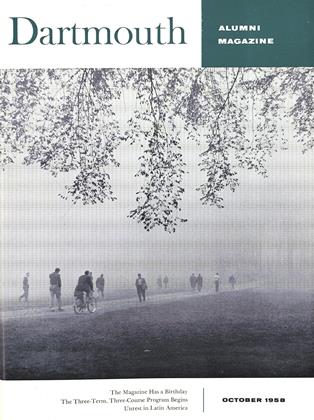ONE Sunday morning in early October 150 years ago, William Tully, an Eli who was enduring the indignities of life in Hanover in order to attend Nathan Smith's medical lectures, accepted an invitation to join the Social Friends. "This was," he said for himself and a couple of equally transient pals, "a favour that I had no right to expect at all; but I thought it possible that, from our belonging once to Yale, it would be extended to us." Later that same day, John Francis, '09, showed up with a bid from the United Fraternity. He had, "through mere laziness procrastinated calling on us; and he relied on our not being known sufficiently to be recommended to the other Society... .He tried to persuade us to break our engagements (which he said was often done in similar cases) but we were immovable."
This may well point a moral to fraternity rushing chairmen in the hectic season that is just starting at the moment this is written; but today's rushing amounts to little more than a mutual exchange of charm between the fraternities and the sophomores for three days, after a year of covert scrutiny. Next Monday the former will list their fancies in order of preference, and the latter will cite up to six houses in descending favor. Then, while the sophomores maintain a death watch in Webster Hall, the IBM ma- chines will match yearling surnames with Greek letters in optimum relationship, and grind out fraternity delegations by the two dozen.
The sophomore rushing system was adopted some thirty years ago. Prior to that, the method was to park one's white flannels on a dirty baggage truck at White River Junction, pick the freshmen off the New York or Boston trains, and put pledge buttons on them before they could say "knife." All the Omaha boys were sunk Alpha Delt; all the Chicago boys went Deke; and all the Melrose hockey players, as now, went Phi Gam. The rest of the houses and livestock took their chances, but there were as few errors and as many temporary heartaches as obtain under today's more highly organized system.
Fraternities are "an important part of the College's social system" for some three-quarters of the upperclassmen; but their position on the Dartmouth campus differs from that in many sister institutions. Undergraduate chapters are limited to 65 members, only eighteen of whom may live in the House - without any facilities for hard eating. Class and College loyalties usually outrank fanatic brotherhood ties, with the result that many Dartmouth chapters are considered mavericks by their national organizations. [Add to this the Dartmouth fraternity decision to abandon all discriminatory clauses in their charters by i960, and you have a further potential deviation from some national credos.]
Nevertheless, fraternities have flourished on the Hanover scene, with their own Council, Treasurers' Association, and Judiciary Committee, and a complicated competitive system of attaining grace in administration, scholarship, special events (hums, plays, ice statues, and debates), athletics, and community service. The old dog-eat-dog spirit has dimmed along with much of the chauvinism and reverence for ritual and all former literary pretensions. But curiously enough the loss of the sense of mystery and the sanctity of the goat room, and the increase of uninhibited sociability in today's undergraduate, have apparently carried a concomitant loss of relaxed humor about fraternal affiliation. We no longer hear the parodied and sometimes ribald chants with which we once thrust good-natured barbs at our own and other sodalities. The ΔKE marching song and the sweetheart of ΣX were wide open for parody, to say nothing of the Golden Pillar of KKK The innumerable Biblical verses of XΦ's "Hard trials, great tribulations" were an unposted acreage for several generations. "I'm a Fiji," . . the pig in the parlor," and "on bended knee" have severally celebrated the virtues and shortcomings of ΦΓΔ , ©ΔX, and ΨΫ.
Turning to more sedate hymns of brotherhood, we have always been puzzled by the existential mechanics posited in:
"Forward then with breast to breast, Leaving no life blighted, March we to our common rest, Hands and hearts united."
But who are we to delve into the Eleusinian mysteries of shrines to which College ukase forbids even the sweet pulp of a pomegranate seed as solid sustenance?
 View Full Issue
View Full Issue
More From This Issue
-
 Feature
FeatureUnrest in Latin America
October 1958 By RICHARD B. McCORNACK -
 Feature
FeatureThe Magazine Has A Birthday
October 1958 By C.E.W. -
 Feature
FeatureHIS JOB Is Running Rockefeller Center
October 1958 By JAMES B. FISHER '54 -
 Feature
FeatureIndependence in Learning
October 1958 -
 Class Notes
Class Notes1953
October 1958 By LT. FREDERICK H. STEPHENS JR., CHARLES B. BUCHANAN -
 Class Notes
Class Notes1921
October 1958 By JOHN HURD, LINCOLN H. WELD
BILL MCCARTER '19
-
 Article
ArticleNot So Long Ago .... Cry Havoc!
December 1933 By Bill McCarter '19 -
 Article
ArticleThe Hanover Scene
July 1953 By BILL McCARTER '19 -
 Article
ArticleThe Hanover Scene
May 1956 By BILL McCARTER '19 -
 Article
ArticleThe Hanover Scene
June 1956 By BILL McCARTER '19 -
 Article
ArticleThe Hanover Scene
June 1958 By BILL McCARTER '19 -
 Article
ArticleTHE HANOVER SCENE
MARCH 1959 By BILL MCCARTER '19







